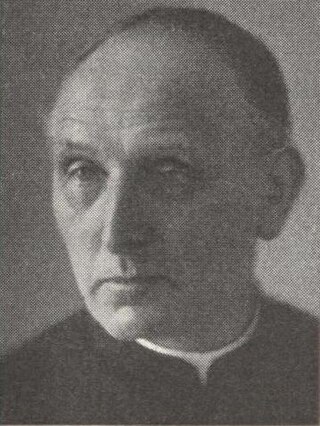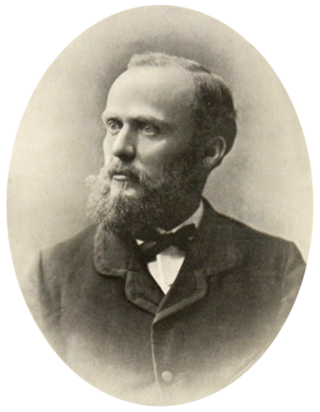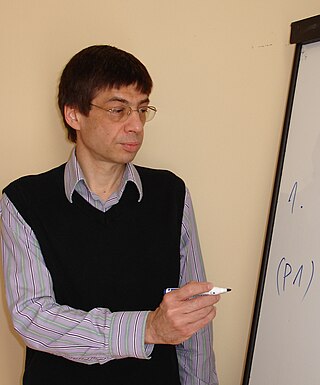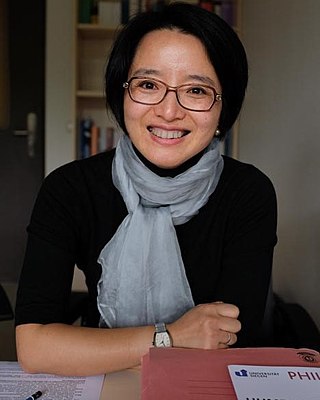In the study of language, description or descriptive linguistics is the work of objectively analyzing and describing how language is actually used by a speech community.

Minangkabau is an Austronesian language spoken by the Minangkabau of West Sumatra, the western part of Riau, South Aceh Regency, the northern part of Bengkulu and Jambi, also in several cities throughout Indonesia by migrated Minangkabau. The language is also a lingua franca along the western coastal region of the province of North Sumatra, and is even used in parts of Aceh, where the language is called Aneuk Jamee.

Wilhelm Schmidt SVD was a German-Austrian Catholic priest, linguist and ethnologist. He presided over the Fourth International Congress of Anthropological and Ethnological Sciences that was held at Vienna in 1952.
Heinz Kloss was a German linguist and internationally recognised authority on linguistic minorities.
Angelika Kratzer is a professor emerita of linguistics in the department of linguistics at the University of Massachusetts Amherst.

Fahrenheit 451 is an interactive fiction game released in 1984 and based on the 1953 novel of the same name by Ray Bradbury. Originally released by software company Trillium, it was re-released in 1985 under the company’s new name Telarium.

The Faculty of Modern Languages was one of fourteen faculties at the University of Tübingen. It was dissolved in 2010 in the course of the administrative reform, where the number of faculties was reduced from fourteen to seven. The faculty merged with the former Faculty of Philosophy and History and the former Faculty of Cultural Anthropology into the new Faculty of Humanities.

Otto Stoll was a Swiss linguist and ethnologist.
Michiel Arnoud Cor de Vaan is a Dutch linguist and Indo-Europeanist. He taught comparative Indo-European linguistics, historical linguistics and dialectology at the University of Leiden until 2014, when he moved to the University of Lausanne in Switzerland. De Vaan had been at the University of Leiden since 1991, first as a student and later as a teacher.

Croatian is the standardized variety of the Serbo-Croatian pluricentric language used by Croats, principally in Croatia, Bosnia and Herzegovina, the Serbian province of Vojvodina, and other neighboring countries. It is the official and literary standard of Croatia and one of the official languages of the European Union. Croatian is also one of the official languages of Bosnia and Herzegovina and a recognized minority language in Serbia and neighboring countries.
Quantitative linguistics (QL) is a sub-discipline of general linguistics and, more specifically, of mathematical linguistics. Quantitative linguistics deals with language learning, language change, and application as well as structure of natural languages. QL investigates languages using statistical methods; its most demanding objective is the formulation of language laws and, ultimately, of a general theory of language in the sense of a set of interrelated languages laws. Synergetic linguistics was from its very beginning specifically designed for this purpose. QL is empirically based on the results of language statistics, a field which can be interpreted as statistics of languages or as statistics of any linguistic object. This field is not necessarily connected to substantial theoretical ambitions. Corpus linguistics and computational linguistics are other fields which contribute important empirical evidence.

Bernhard Gröschel was a German linguist and slavist.

Jürgen Handke is a German professor of English linguistics.
The Days of Swiss Linguistics (DSL) is a series of linguistics conferences held biennially at one of the Swiss universities on behalf of the Swiss Linguistics Society (SSG). It is an international conference for researchers from Switzerland, Europe and beyond. So far, 11 editions of the conference have been carried out, the next conference will take place in 2022 at Université de Lausanne.

András Kertész is a Hungarian linguist, professor, full member of the Hungarian Academy of Sciences. His research focuses on the philosophy of linguistics, theoretical linguistics and foundational problems of syntax, semantics and pragmatics. He works both in Hungary and around the world, and has published in English, German and Hungarian.

Zhao Jin is a Chinese professor of German linguistics and a scholar in cultural-analytical linguistics.
Senta Trömel-Plötz is a German linguist. Together with Luise F. Pusch she introduced feminist linguistics in Germany.

I Wayan Arka is an Indonesian-Balinese linguist, lecturer, scholar and researcher at Udayana University (UNUD) in Bali, Indonesia and the Australian National University (ANU) in Canberra, Australia.
Monika Schwarz-Friesel is a German cognitive scientist, professor at the Technical University of Berlin and one of Europe’s most distinguished antisemitism researchers according to Marc Neugröschel from the newspaper The Times of Israel. She is often interviewed by media outlets like Haaretz, Der Standard or Der Tagesspiegel on her research on current forms of antisemitism, which often take place on the internet.










